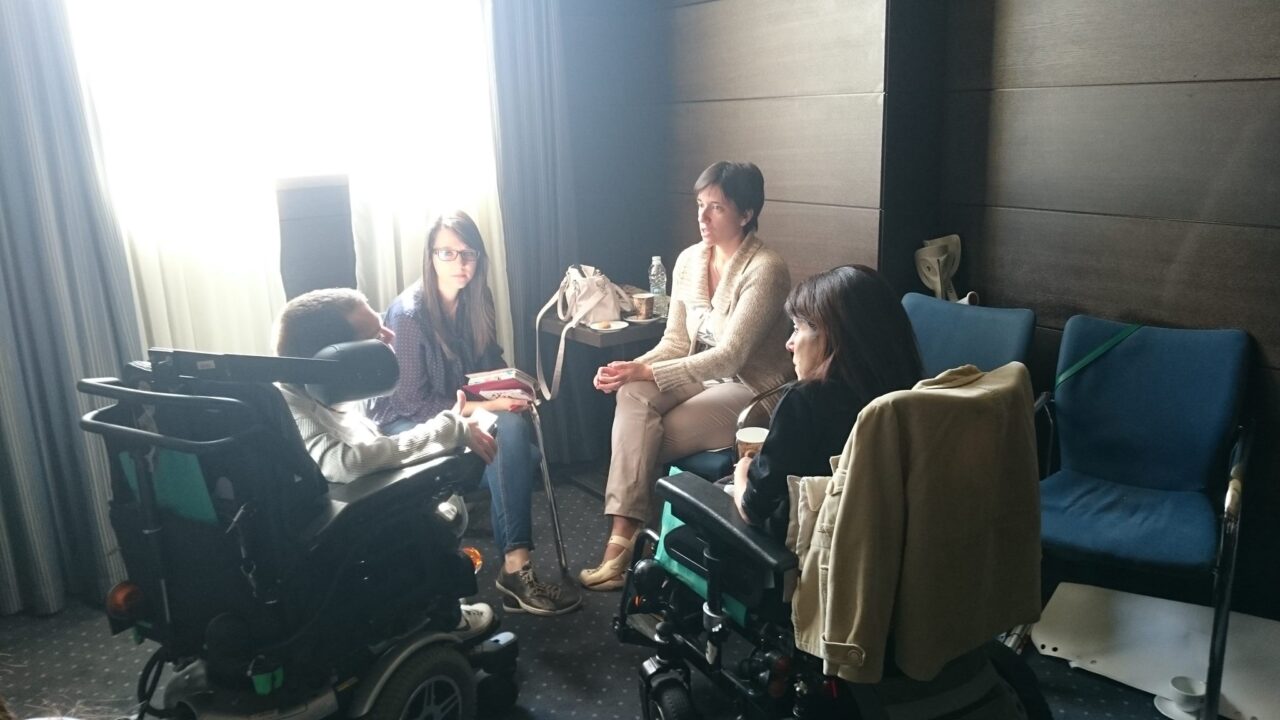Personal assistants are not supposed to be professionals, qualified through formal degrees or pre-determined qualification requirements. Nevertheless, considerable professionalization is needed and occurs through peer support based non-formal and informal education.
By Florian Sanden, florian.sanden@enil.eu
Members of the Independent Living Movement but also independent researchers assign peer support-based services a high effectiveness in supporting disabled people. In 2004 Stainton and Boyce evaluated two direct payment schemes in Wales and found that the availability of a “user driven Independent Living Scheme” was a key factor in making the administrative burden manageable and direct payments a useful approach (Stainton & Boyce 2004). According to Jim-Elder Woodward, the employment service of the Glasgow Independent Living Centre achieved a job placement rate of 82,4% compared to 9,2% by government agencies. In a project 94,1% of participants were guided into achieving an academic qualification (Elder Woodward 2014).
Peer support in the UN CRPD
The United Nations Convention on the Rights of Persons with Disabilities (UN CRPD) mentions peer support in article 24 on education and article 26 on habilitation and rehabilitation. According to the Guidelines on Deinstitutionalisation, including in emergencies, of the Committee on the Rights of Persons with Disabilities, peer support is a disability support service which is vital to achieve and prevent deinstitutionalisaton and ensure self-determination.
Defining peer support
The European Network on Independent Living defines peer support as “the help and support that people with lived experiences are able to give to another individual in a similar situation” (ENIL 2022). The ENIL Peer Support Survey explains that the term can refer to “support provided by someone using personal assistance to another person using a PA. Or to somebody who has lived in an institution in the past to other people still living in an institution” (ENIL 2016).
Power structures and de-professionalisation
When ENIL was founded in 1989 its Straßbourg resolution announced that fighting against oppression and taking back power from professionals were among the key objectives of the organisation. Hale Zukas, one of the founders of the first Centre of Independent Living (CIL) in Berkeley, stated that the Independent Living Movement was to challenge the power of professionals involved in deciding about disabled people such as physicians, rehabilitators, nurses, psychologists, social workers and others (Mladenov et al 2023). In this context, the them “professionals” refers to persons with formal degrees supposed to qualify them to work with disabled people. Rather than working in union with disabled people and supporting them to reach their own decisions, professionals more often than not opted to ignore the will of the people affected. Formally qualified persons, until today, tend to conclude that it is best for disabled people to live in segregated settings such as residential institutions even though many don´t want to an there is clear evidence that such places are harmful. From the beginning the Independent Living Movement advocated for the full self-determination of disabled people to take all decisions about their lives themselves.
PA-user cooperatives and Centres for Independent Living
To start providing services without the involvement of traditional types of professionals, the Stockholm Cooperative for Independent Living (abbreviated in Swedish as STIL) was founded in 1989. The STIL is a disabled person´s organisation which provides personal assistance (PA) services to its members. Personal assistance is often considered the most important among a variety of support services needed to allow all disabled people full self-determination. STIL is also a PA-user cooperative, meaning that it is owned and run by disabled people many of whom are personal assistance users themselves.
The funding for personal assistance is provided by the Swedish public and dispersed through direct payments directly to the disabled person. When opting for PA provision through STIL, the beneficiary forwards the personal budget to the organisation which hires and pays the personal assistant(s) on the persons´ behalf.
Based on the example of STIL, ULOBA-Independent Living Norge SA was founded in 1991 in Norway. ULOBA has to objective to function according to the principles of the Independent Living movement and among others, fight professionalisation. Peer support and peer counselling are the methods. Like STIL, ULOBA is a PA-user cooperative. It is owned and run by disabled people.
Professionalising personal assistants
The main task of STIL and ULOBA is to support their members in managing personal assistance. Having formal qualifications like degrees in social work which supposed to qualify to work with disabled people is considered undesirable. To ensure the disabled person is in control, it is policy of both cooperatives that the PA-users train their assistants themselves. Non-formal and informal education are thus the training methods favoured. Non-formal education refers to any kind of lesson involving sitting down and listening to someone without the possibility of obtaining a formal degree. Informal education refers to any kind of knowledge picked up while pursuing task. Learning by doing would be the correct term in everyday language.
Personal assistants have to learn many things. When assisting in any area needed and spending much time a person, PAs get involved closely in somebody elses´ life. Despite this close, involvement PAs must not become overprotective of the disabled person or too autonomous in managing affairs and taking decisions. Maintaining the precise balance between under supporting and taking over can be challenging. When being out in public, PAs are required to stay close to the disabled person so they can provide support. At the same time they are not supposed to involve themselves too much in the users´ activities, peak of the disabled persons´ behalf or initiative small talk with an acquaintance while ignoring the needs of the user. Since PAs are supposed to support in all areas of life, they need to have the skills to do that.
All these requirements, place considerable demands on personal assistance, making it a challenging job. It is expected of them to develop a particular set of skills and to display a type of professional behaviour which might not be easy to develop for some.
Professionalising the PA user
Managing and training a PA up to the expected standard of professional behaviour can be challenging. To ensure users are able to train theirs assistants, every applicant for membership at STIL has to take a course in which experienced members teach newcomers the skills to supervise. “We train our members so that they in turn can train their assistants”. “The course covers such topics as assessing one´s needs, negotiating with government agencies for funds, advertising for assistants, interviewing job applicants, setting up a job contract as well as scheduling , training, supervising and – if necessary – firing assistants”. By going through this training, future PA-users become well versed in managing and training assistants. At the end of the course have to pass a test to become a member. Thus, a non-formal education is awarded. Perioding evening peer support sessions ensure continuous training of users. Working with PAs for many years adds a high level of skill acquired through informal education. The expertise gained this way is valuable. Course instructors are members of the cooperative who have a long personal experience of employing assistants.
At ULOBA too, members have to go through mandatory trainings to learn how to manage, including trainings their PAs.
Professionalising staff
Next to providing trainings, one of the main activities of PA user cooperatives is to manage payroll services on behalf of the PA-users. Handling payroll services is a task involving much responsibility for which a formal qualification is required. Because STIL and ULOBA attempt to fill their positions with disabled staff, the principle of peer support is maintained.
Conclusion
Personal assistants are expected to conduct their duties professionally and thus require professionalisation through training. To ensure control over the service, STIL and ULOBA oblige users to train their assistants themselves. To enable users to execute this challenging task, they are trained by more experienced users. The training of PAs and users is thus achieved through non-formal and informal education. Because disabled peers do the training, non-disabled professionals have no power over it. Rather than abolishing professionalisation, an alternative way of professionalisation is pursued. Peer support based professionalisation has significant potential in reducing the power of non-disabled professionals. In peer support, there are instances where also formal professionalisation is required.



